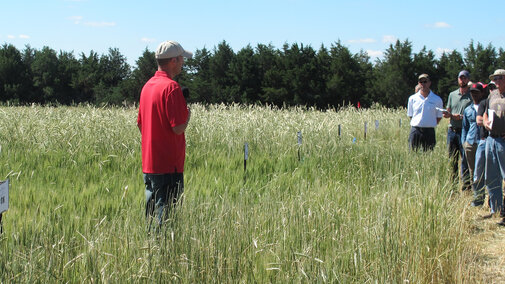What emerging issues will challenge crop and livestock producers in the High Plains? What research is going on at University of Nebraska-Lincoln (UNL) and land-grant universities in response? What are the lessons from that research?
A public meeting on dryland production in the High Plains will be February 21 in Sidney. The morning sessions will feature agriculture topics of broad interest by speakers from three states. After lunch will be the annual meeting of the advisory committee for the UNL High Plains Ag Lab (HPAL) north of Sidney.
In addition to UNL researchers, this year's event will feature speakers from the Nebraska Wheat Board, Colorado State University (CSU), and Kansas State University (KSU), according to Cody Creech, dryland cropping systems specialist at the Panhandle Research and Extension Center at Scottsbluff and faculty supervisor at the High Plains Ag Lab.
The latest results from crop and livestock research at HPAL, as well as administrative and business updates, will be shared with the HPAL advisory board and the public at the annual research update after lunch.
The morning session on Dryland Production in the High Plains will start with coffee and doughnuts at 8:30 a.m. at the Cheyenne County Community Center, 627 Toledo St. The public is welcome, but attendees are asked to RSVP if they plan to attend. Call HPAL at 308-254-3918 or email Farm
Manager Jake Hansen at jhansen19@unl.edu to ensure an accurate count for lunch.
Morning presentations, which begin at 9 a.m., will include:
- Welcome and Overview – Cody Creech, UNL dryland cropping systems specialist;
- HPAL 2018 Crop Production – Jake Hansen, HPAL farm manager;
- Breeding Update for Alternative Crops (Proso Millet, Field Pea, and Sunflower), Forage, Triticale, and Malting Barley – Dipak Santra, UNL alternative crops breeder;
- Wheat Stem Sawfly: Where Are They Coming From? – Jeff Bradshaw, UNL entomologist;
- Annual Forages for Grazing and Haying – Mitch Stephenson, UNL forage and range specialist;
- Mineral Consumption and Performance of Grazing Cattle Consuming A Self-Regulated Ionophore – Karla Jenkins, UNL range management cow/calf specialist;
- Pre-Emergent Herbicides for Improved Kochia Control in Chemical Fallow – John Spring, CSU area extension agent;
- Management Strategies to Improve Winter Wheat Establishment and Yield – Amanda Easterly, UNL dryland crops research lab manager;
- Dryland Crops Research Update – Cody Creech, UNL dryland cropping systems specialist;
- Nebraska Wheat – Tyson Narjes, Nebraska Wheat Board; and
- Kansas Dryland Corn Research – Lucas Haag, KSU northwest area agronomist.
Afternoon sessions will include:
- Panhandle Research and Extension District Happenings – Jack Whittier, District Director; and the
- HPAL Advisory Board Meeting, starting at 1 p.m. Topics will include:
- Changes in Personnel, Facilities, Equipment, and Production – Jake Hansen;
- What’s Up With Research – UNL Specialists;
- HPAL Field Days – Cody Creech; and
- HPAL Short-term Plan – Cody Creech and Jake Hansen.

